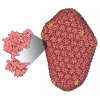[English] 日本語
 Yorodumi
Yorodumi- PDB-9atz: HIV 16055.v8.3 SOSIP Env in Complex with V2 Epitope and Anti-Immu... -
+ Open data
Open data
- Basic information
Basic information
| Entry | Database: PDB / ID: 9atz | |||||||||||||||||||||||||||
|---|---|---|---|---|---|---|---|---|---|---|---|---|---|---|---|---|---|---|---|---|---|---|---|---|---|---|---|---|
| Title | HIV 16055.v8.3 SOSIP Env in Complex with V2 Epitope and Anti-Immune Complex pAbs from Rabbit 2464 | |||||||||||||||||||||||||||
 Components Components |
| |||||||||||||||||||||||||||
 Keywords Keywords | VIRAL PROTEIN / HIV / Polyclonal / Antibodies / CryoEMPEM / Rabbit / Anti-Immune Complex / V1/V3 | |||||||||||||||||||||||||||
| Function / homology |  Function and homology information Function and homology informationsymbiont-mediated perturbation of host defense response / positive regulation of plasma membrane raft polarization / positive regulation of receptor clustering / host cell endosome membrane / clathrin-dependent endocytosis of virus by host cell / viral protein processing / fusion of virus membrane with host plasma membrane / fusion of virus membrane with host endosome membrane / viral envelope / virion attachment to host cell ...symbiont-mediated perturbation of host defense response / positive regulation of plasma membrane raft polarization / positive regulation of receptor clustering / host cell endosome membrane / clathrin-dependent endocytosis of virus by host cell / viral protein processing / fusion of virus membrane with host plasma membrane / fusion of virus membrane with host endosome membrane / viral envelope / virion attachment to host cell / host cell plasma membrane / virion membrane / structural molecule activity / membrane Similarity search - Function | |||||||||||||||||||||||||||
| Biological species |   Human immunodeficiency virus 1 Human immunodeficiency virus 1 | |||||||||||||||||||||||||||
| Method | ELECTRON MICROSCOPY / single particle reconstruction / cryo EM / Resolution: 3.4 Å | |||||||||||||||||||||||||||
 Authors Authors | Brown, S. / Antansijevic, A. / Ward, A.B. | |||||||||||||||||||||||||||
| Funding support |  United States, 2items United States, 2items
| |||||||||||||||||||||||||||
 Citation Citation |  Journal: Sci Immunol / Year: 2025 Journal: Sci Immunol / Year: 2025Title: Anti-immune complex antibodies are elicited during repeated immunization with HIV Env immunogens. Authors: Sharidan Brown / Aleksandar Antanasijevic / Leigh M Sewall / Daniel Montiel Garcia / James Ferguson / Philip J M Brouwer / Rogier W Sanders / Andrew B Ward /    Abstract: Vaccination strategies against HIV-1 aim to elicit broadly neutralizing antibodies (bnAbs) using prime-boost regimens with HIV envelope (Env) immunogens. Epitope mapping has shown that early antibody ...Vaccination strategies against HIV-1 aim to elicit broadly neutralizing antibodies (bnAbs) using prime-boost regimens with HIV envelope (Env) immunogens. Epitope mapping has shown that early antibody responses are directed to easily accessible nonneutralizing epitopes on Env instead of bnAb epitopes. Autologously neutralizing antibody responses appear upon boosting, once immunodominant epitopes are saturated. Here, we use electron microscopy-based polyclonal epitope mapping (EMPEM) to elucidate how repeated immunization with HIV Env SOSIP immunogens results in the generation of Ab2α anti-idiotypic antibodies in rabbits and rhesus macaques. We present the structures of six anti-immune complex antibodies and find that they target idiotopes composed of framework regions of antibodies bound to Env. Examination of cryo-electron microscopy density enabled prediction of sequences for an anti-immune complex antibody, the paratope of which is enriched with aromatic amino acids. This work sheds light on current vaccine development efforts for HIV, as well as for other pathogens in which repeated exposure to antigen is required. | |||||||||||||||||||||||||||
| History |
|
- Structure visualization
Structure visualization
| Structure viewer | Molecule:  Molmil Molmil Jmol/JSmol Jmol/JSmol |
|---|
- Downloads & links
Downloads & links
- Download
Download
| PDBx/mmCIF format |  9atz.cif.gz 9atz.cif.gz | 526.3 KB | Display |  PDBx/mmCIF format PDBx/mmCIF format |
|---|---|---|---|---|
| PDB format |  pdb9atz.ent.gz pdb9atz.ent.gz | Display |  PDB format PDB format | |
| PDBx/mmJSON format |  9atz.json.gz 9atz.json.gz | Tree view |  PDBx/mmJSON format PDBx/mmJSON format | |
| Others |  Other downloads Other downloads |
-Validation report
| Summary document |  9atz_validation.pdf.gz 9atz_validation.pdf.gz | 2.6 MB | Display |  wwPDB validaton report wwPDB validaton report |
|---|---|---|---|---|
| Full document |  9atz_full_validation.pdf.gz 9atz_full_validation.pdf.gz | 2.6 MB | Display | |
| Data in XML |  9atz_validation.xml.gz 9atz_validation.xml.gz | 79.7 KB | Display | |
| Data in CIF |  9atz_validation.cif.gz 9atz_validation.cif.gz | 127.9 KB | Display | |
| Arichive directory |  https://data.pdbj.org/pub/pdb/validation_reports/at/9atz https://data.pdbj.org/pub/pdb/validation_reports/at/9atz ftp://data.pdbj.org/pub/pdb/validation_reports/at/9atz ftp://data.pdbj.org/pub/pdb/validation_reports/at/9atz | HTTPS FTP |
-Related structure data
| Related structure data |  43838MC 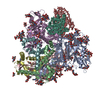 9axdC 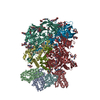 9axiC 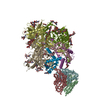 9axkC 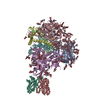 9ay6C 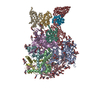 9aysC 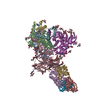 9ayvC M: map data used to model this data C: citing same article ( |
|---|---|
| Similar structure data | Similarity search - Function & homology  F&H Search F&H Search |
- Links
Links
- Assembly
Assembly
| Deposited unit | 
|
|---|---|
| 1 |
|
- Components
Components
-Protein , 2 types, 6 molecules DIMOPQ
| #4: Protein | Mass: 58156.312 Da / Num. of mol.: 3 Source method: isolated from a genetically manipulated source Details: This sequence contains engineered SOSIP mutations. The construct sequence is not identical to wild type Env. The first thirty residues in the sequence is an expression tag. Source: (gene. exp.)   Human immunodeficiency virus 1 / Gene: env / Production host: Human immunodeficiency virus 1 / Gene: env / Production host:  Homo sapiens (human) / References: UniProt: A1EAI1 Homo sapiens (human) / References: UniProt: A1EAI1#6: Protein | Mass: 17430.652 Da / Num. of mol.: 3 Source method: isolated from a genetically manipulated source Details: This sequence contains engineered SOSIP mutations. The construct sequence is not identical to wild type Env. Source: (gene. exp.)   Human immunodeficiency virus 1 / Gene: env / Production host: Human immunodeficiency virus 1 / Gene: env / Production host:  Homo sapiens (human) / References: UniProt: A0A0B5KUY7 Homo sapiens (human) / References: UniProt: A0A0B5KUY7 |
|---|
-Antibody , 4 types, 12 molecules AFNBGKCHLEJR
| #1: Antibody | Mass: 9209.344 Da / Num. of mol.: 3 / Source method: isolated from a natural source Details: The sequence of this polyclonal antibody is unknown. Source: (natural)  #2: Antibody | Mass: 9549.763 Da / Num. of mol.: 3 / Source method: isolated from a natural source Details: The sequence of this polyclonal antibody is unknown. Source: (natural)  #3: Antibody | Mass: 10656.127 Da / Num. of mol.: 3 / Source method: isolated from a natural source Details: The sequence of this polyclonal antibody is unknown. Source: (natural)  #5: Antibody | Mass: 9464.658 Da / Num. of mol.: 3 / Source method: isolated from a natural source Details: The sequence of this polyclonal antibody is unknown. Source: (natural)  |
|---|
-Sugars , 3 types, 46 molecules 
| #7: Polysaccharide | 2-acetamido-2-deoxy-beta-D-glucopyranose-(1-4)-2-acetamido-2-deoxy-beta-D-glucopyranose Source method: isolated from a genetically manipulated source #8: Polysaccharide | Source method: isolated from a genetically manipulated source #9: Sugar | ChemComp-NAG / |
|---|
-Details
| Has ligand of interest | N |
|---|---|
| Has protein modification | Y |
| Sequence details | The antibodies that are part of this complex come from polyclonal sera. As a result, the sequences ...The antibodies that are part of this complex come from polyclonal sera. As a result, the sequences for these antibodies are unknown. They are modeled as a poly-UNK chains. |
-Experimental details
-Experiment
| Experiment | Method: ELECTRON MICROSCOPY |
|---|---|
| EM experiment | Aggregation state: PARTICLE / 3D reconstruction method: single particle reconstruction |
- Sample preparation
Sample preparation
| Component | Name: HIV-1 16055 SOSIP Env in Complex with Rabbit Polyclonal Antibodies - V2 Epitope and Anti-Immune Complex pAbs Type: COMPLEX / Entity ID: #1-#6 / Source: MULTIPLE SOURCES |
|---|---|
| Molecular weight | Experimental value: NO |
| Source (natural) | Organism:  |
| Buffer solution | pH: 7.4 |
| Specimen | Conc.: 5.2 mg/ml / Embedding applied: NO / Shadowing applied: NO / Staining applied: NO / Vitrification applied: YES |
| Specimen support | Grid material: COPPER / Grid mesh size: 400 divisions/in. / Grid type: Quantifoil R1.2/1.3 |
| Vitrification | Instrument: FEI VITROBOT MARK IV / Cryogen name: ETHANE / Humidity: 100 % / Chamber temperature: 283 K |
- Electron microscopy imaging
Electron microscopy imaging
| Experimental equipment |  Model: Titan Krios / Image courtesy: FEI Company |
|---|---|
| Microscopy | Model: TFS KRIOS |
| Electron gun | Electron source:  FIELD EMISSION GUN / Accelerating voltage: 300 kV / Illumination mode: FLOOD BEAM FIELD EMISSION GUN / Accelerating voltage: 300 kV / Illumination mode: FLOOD BEAM |
| Electron lens | Mode: BRIGHT FIELD / Nominal defocus max: 1800 nm / Nominal defocus min: 500 nm |
| Image recording | Electron dose: 50 e/Å2 / Detector mode: COUNTING / Film or detector model: GATAN K2 SUMMIT (4k x 4k) |
- Processing
Processing
| EM software |
| ||||||||||||||||||||||||
|---|---|---|---|---|---|---|---|---|---|---|---|---|---|---|---|---|---|---|---|---|---|---|---|---|---|
| CTF correction | Type: PHASE FLIPPING AND AMPLITUDE CORRECTION | ||||||||||||||||||||||||
| Symmetry | Point symmetry: C1 (asymmetric) | ||||||||||||||||||||||||
| 3D reconstruction | Resolution: 3.4 Å / Resolution method: FSC 0.143 CUT-OFF / Num. of particles: 23375 / Symmetry type: POINT | ||||||||||||||||||||||||
| Refine LS restraints |
|
 Movie
Movie Controller
Controller




















 PDBj
PDBj

